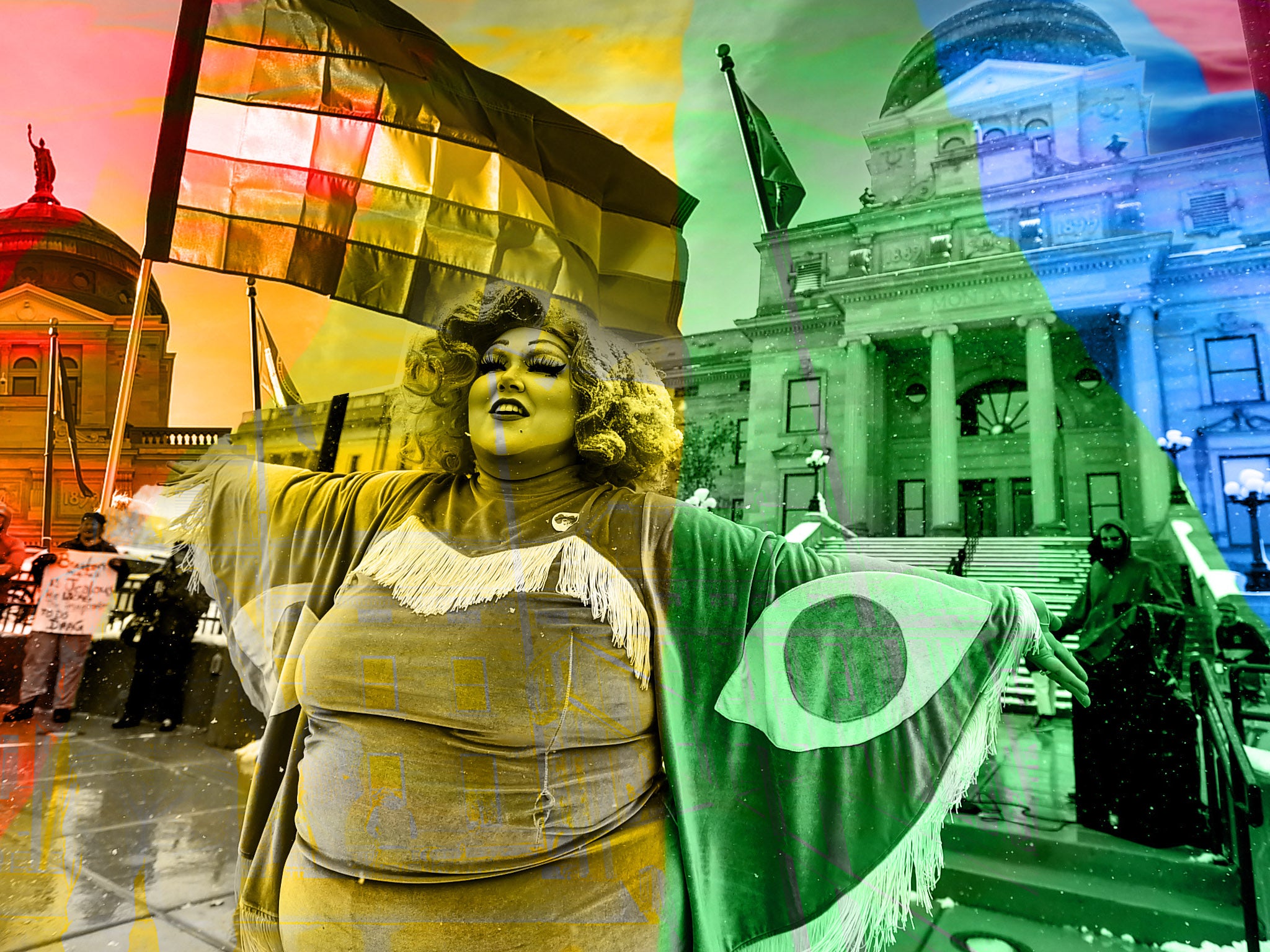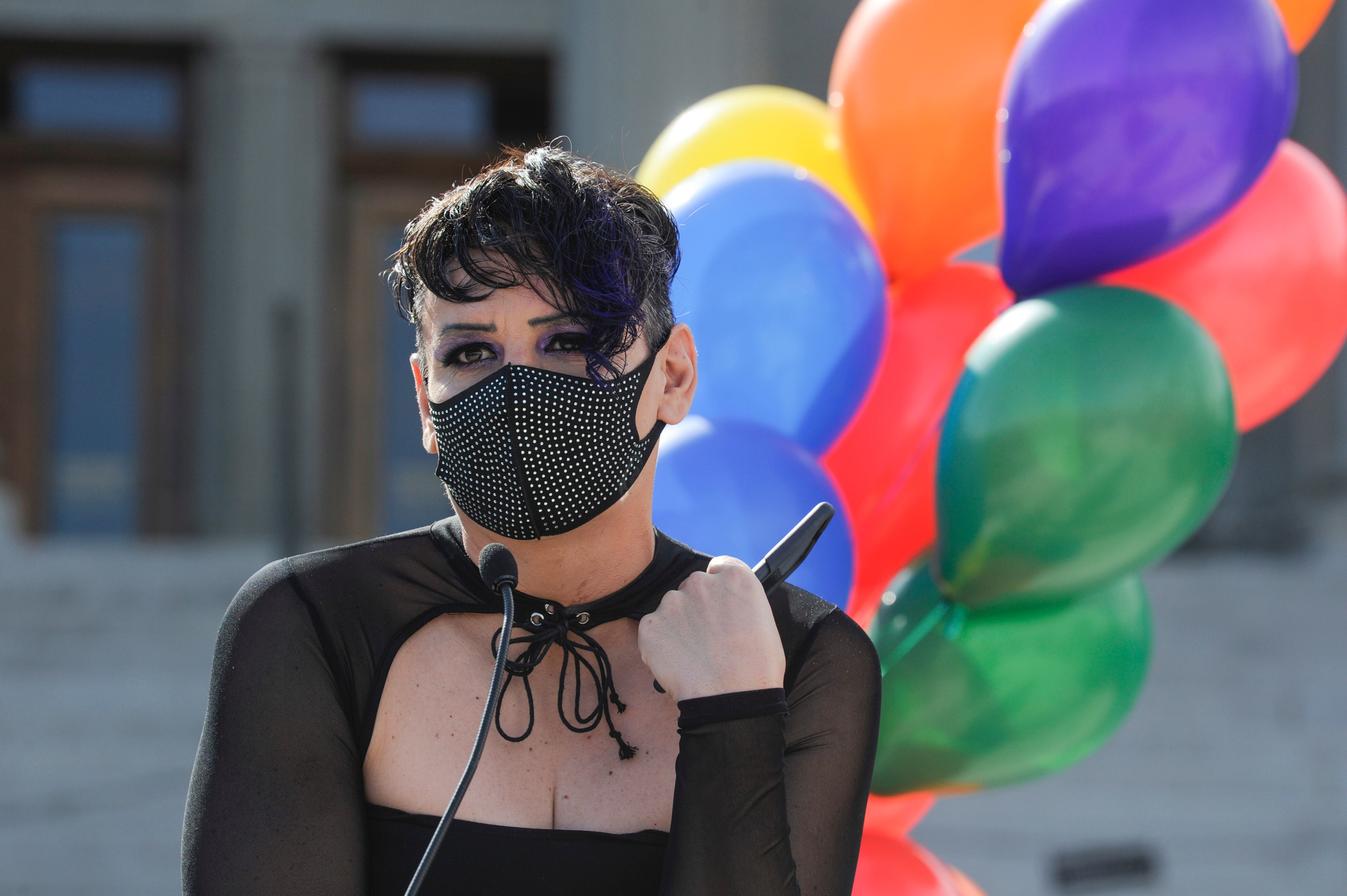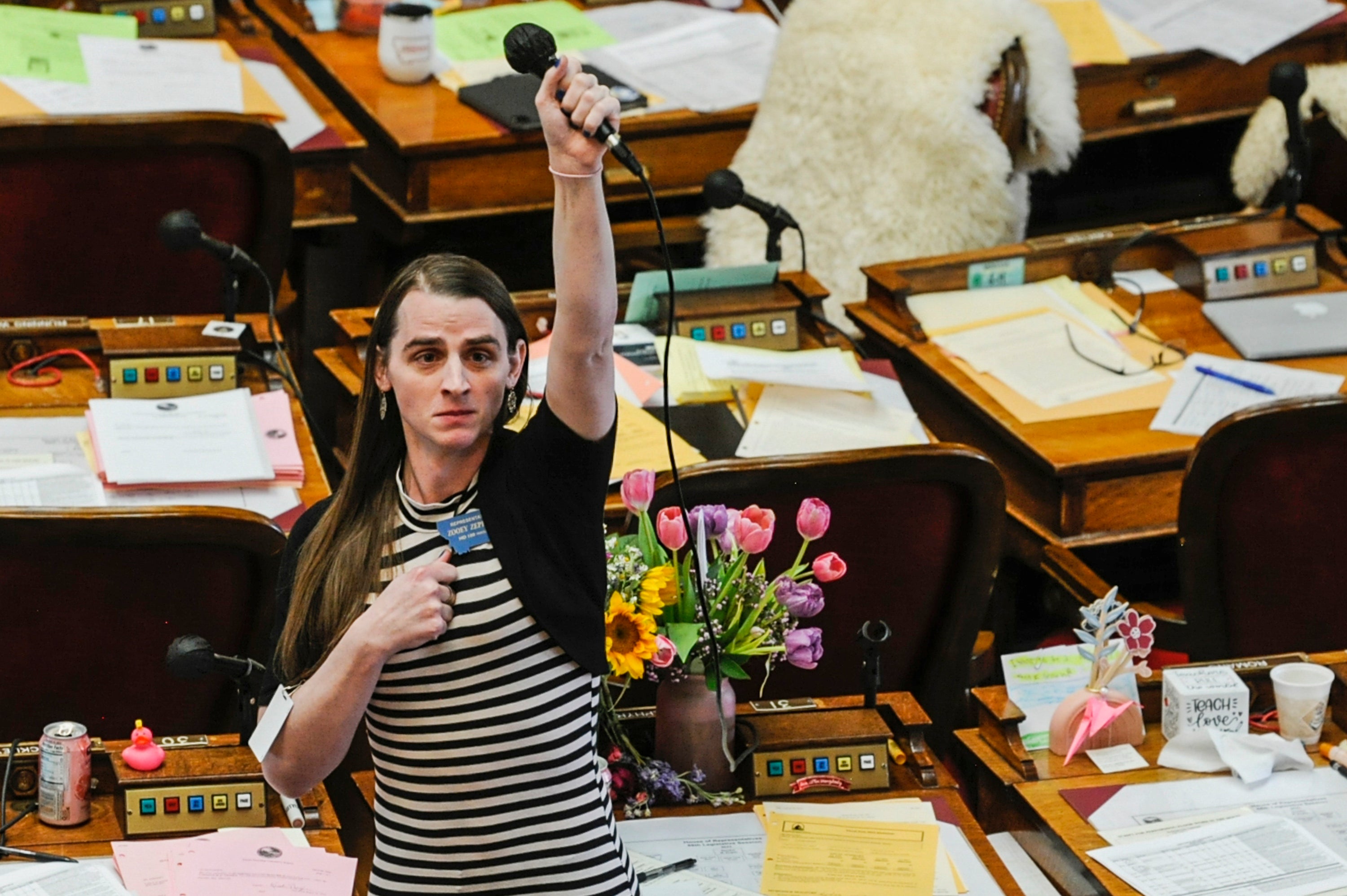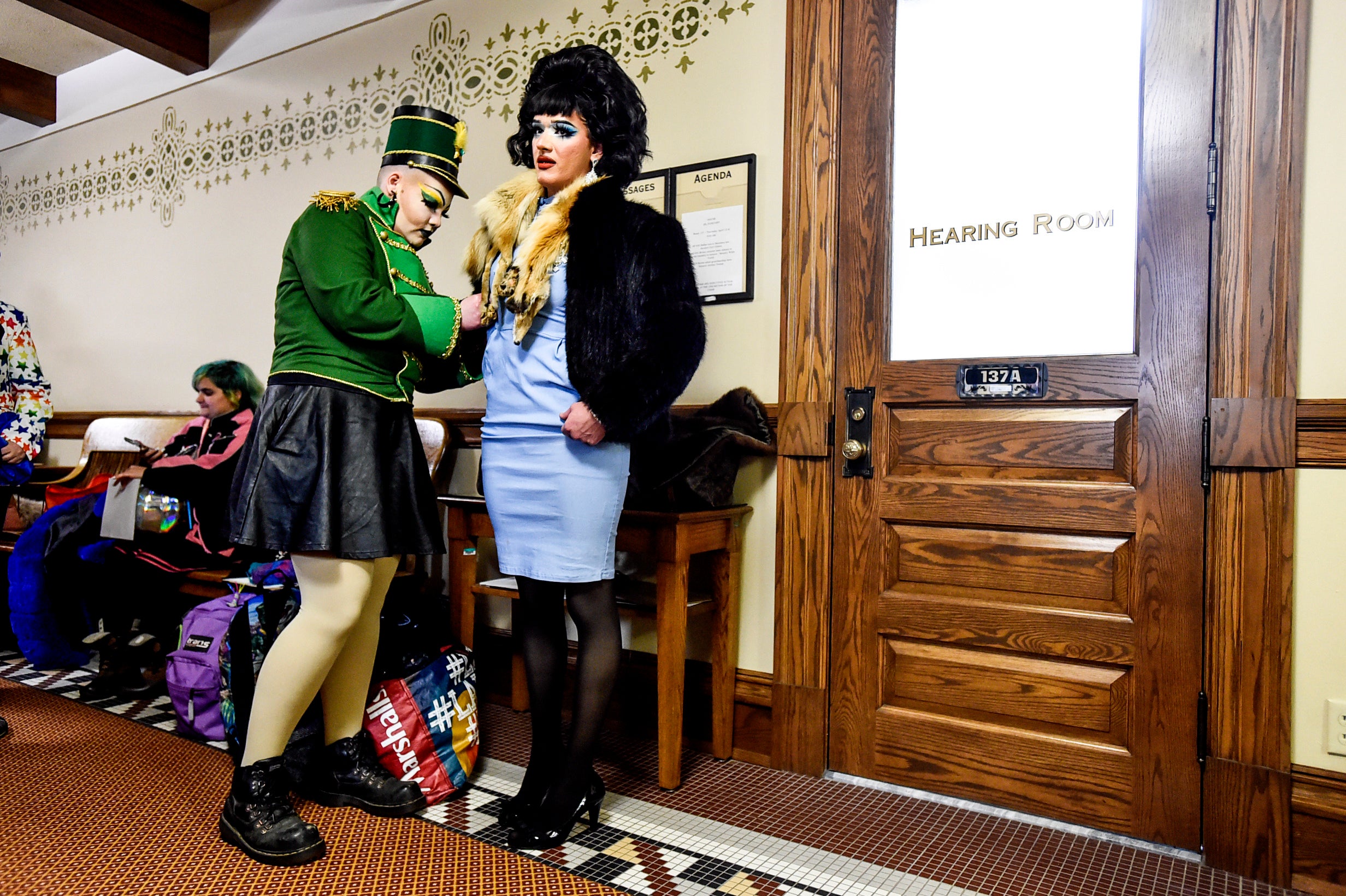Neo-Nazis can’t stop Pride in Montana: ‘Yes, we are under attack. But we will not be quiet’
LGBT+ communities celebrate queer joy after far-right threats, a severe anti-drag law and one of the most volatile legislative sessions in the country, Alex Woodward reports


Days after Republican Governor Greg Gianforte signed a bill into law that explicitly bans drag performers from Montana’s public libraries, a trans woman’s appearance at the Butte Public Library was canceled “out of an abundance of caution”.
Adria Jawort, a Billings-based author who has written extensively about the state’s LGBT+ history and far-right extremism, appears to be the first person targeted by a fresh wave of state laws driving out drag performers from public spaces, part of a broader right-wing campaign to remove LGBT+ people from public life altogether.
“This is exactly what my fear of these unconstitutional bills motivated by bigotry would do: be used to target transgender and gender nonconforming people,” Ms Jawort tells The Independent. “Now here we are with me being silenced as predicted.”
Days earlier, a neo-Nazi group marched to a local bookstore in Bozeman to disrupt a drag story hour during the city’s first Pride festival in more than 10 years. Inside a Target in Missoula on 25 May, a man harassed a trans couple before throwing Pride-themed clothing to the floor.
The scenes in Montana echo similar threats facing Pride celebrations and LGBT+ people across the country, with homophobic and transphobic rhetoric consuming right-wing media and volatile state legislative sessions introducing a historic wave of bills targeting LGBT+ Americans.
To Kev Hamm, director of Montana Pride, the threats are nothing new.
“They’re just louder,” he tells The Independent. “What we need is more allies to step in to say, ‘No, we don’t need you.’”
Montana has Pride events throughout the state from the spring through August, spreading out several months of joy with a renewed call to action and community.
“If you want to know what it looks like for queer communities to celebrate … just go to your Pride in your area, and you’re going to meet amazing people,” Mr Hamm says. “The only people who see us as a threat are the ones hiding from themselves.”
How neo-Nazi groups used Montana’s anti-drag law to silence trans people
Adria Jawort, a member of the Northern Cheyenne Tribe and political director of Indigenous Transilience, was a scheduled guest speaker at the Butte Public Library’s “First Fridays” lecture series on 2 June, where she planned to discuss the history of Indigenous trans and Two Spirit people in Montana and the American West, referring to a spectrum of gender identities and presentations within Indigenous nations.
Instead, one day earlier, she received an email from a library employee announcing that the library was canceling the event, under recommendation from a county attorney that hosting her lecture would violate recently enacted House Bill 359. The law bans drag performers on public property and explicitly mentions drag story hours at libraries and schools. Violations of the law include fines of up to $5,000.
It was signed into law on 22 May, with immediate effect.
“Our commitment to promoting inclusivity and intellectual exploration remains, but not in violation of the law,” according to a statement from library director Stef Johnson.
Weeks earlier, in her testimony against House Bill 359, Ms Jawort warned lawmakers that it would ultimately be wielded against trans people, echoing testimony from LGBT+ advocates making similar appeals in state capitols across the country against other broadly written legislation: Banning drag will not only chill free speech but be selectively invoked to control LGBT+ people altogether.
The county attorney said a decision to cancel the event stemmed from a barrage of Facebook complaints – a campaign that appears to have been coordinated and celebrated by neo-Nazi and white supremacist groups in the state.
“Hello, there is a transexual reading to children at the public library on Friday the 2nd, the ‘performer’ has posted on Twitter that it will be discussion sexual acts and there may be children there. This is illegal under Montana state law now, will the local police be allowing this to happen,” according to a Facebook message sent to the county.
Those cited posts were from Ms Jawort herself, who was mocking the newly enacted law and the absurdity that a transgender person’s lecture “literally might be illegal in Mont. as a flamboyantly dressed trans woman.”
Ms Jawort’s remarks were ultimately rescheduled and moved to a union hall in Butte at an event hosted by Butte America Foundation and KBMF Radio on 20 June.
But her cancelation appears to be a “cut-and-dry First Amendment and civil rights violation,” she says, and one that LGBT+ advocates, lawmakers and legal groups fear will not be the last.
“The librarians and library employees were particularly upset by this, so I have a lot of empathy for them,” Ms Jawort tells The Independent. “It breaks my heart to see them being so disgustingly attacked as groomers and pedophiles across the country by the types of people who haven’t read a novel since high school.”
The legislation was among several bills targeting LGBT+ people in the state’s 2023 legislative session, marked by historic protests and the near-expulsion of state Rep Zooey Zephyr, the first openly transgender woman elected to Montana’s legislature.
“When I spoke about how this bill could be used to target trans people, Republican leadership objected multiple times, stating that ‘the bill had nothing to do with the transgender community,’” Ms Zephyr wrote. “They know what the legislative intent of these bills are.”
‘What it really comes down to is community taking care of community’
Montana, the Big Sky state and an emblem of the vast American West, has historically been viewed as one of the most independent states in the country, with a history of ticket-splitting elections and a resistance to uniparty rule that has dominated neighbouring states.
But within the last few years, with a Republican supermajority controlling both the state House and Senate as well as the governor’s office, GOP officials have advanced a series of laws targeting abortion rights and trans people.
A 2021 measure blocked trans athletes from competing on teams consistent with their genders. A volley of bills in 2023 aimed at LGBT+ people and led to the Republican-led removal of the state’s only trans state lawmaker from the House chambers.
The 2023 legislative session was “the worst, most difficult session I think many of us have ever seen in Montana,” says Quinn Leighton with Planned Parenthood Advocates of Montana.
“The tenor, rhetoric and vitriol within those committees was astounding,” with right-wing officials comparing trans people to pedophiles and groomers and satanism, Leighton tells The Independent. “So many bills and so much rhetoric about who can make what decisions about their bodies, largely going after trans people, any person who needs access to an abortion and any person who is transitioning and needs access to gender-affirming care.”
Centering the stories of the people who will be most affected by discriminatory legislation “felt like we were just talking to a wall most of the time,” Leighton says.
“It just really feels like we’re living in a state that doesn’t want us, is telling us we don’t belong, and we don’t matter,” Leighton says. “When our government or systems fail, what it really comes down to is community taking care of community.”

Hundreds of bills aimed at LGBT+ people, particularly young trans people, have been filed in nearly every state within the last several years, part of a growing campaign among Republican lawmakers wielding anti-trans attacks for political agendas that dominate GOP platforms heading into 2024.
Lawmakers across the country have introduced more bills targeting LGBT+ Americans this year than in each of the previous five years.
By the end of May, state lawmakers had introduced more than 500 bills impacting LGBT+ people in 2023, including 220 bills specifically restricting the rights of trans and nonbinary Americans, according to an analysis from the Human Rights Campaign. More than 70 such bills have been signed into law.
At least 19 states have enacted laws or policies banning affirming healthcare for young trans people, which courts have blocked in several states.
Republican members of Congress, meanwhile, have introduced federal legislation that mirrors some of the proposals dominating state capitols. One measure would impose national restrictions on trans athletes, and another bill would impose a similar but more-expansive version of what critics have called state-level “Don’t Say Gay” bills aimed at restricting classroom discussion of LGBT+ people and events.
That tide of legislation and the volatile political debate surrounding it have also negatively impacted the mental health of an overwhelming majority of young trans and nonbinary people, according to polling from The Trevor Project and Morning Consult. A separate survey from The Trevor Project found that 41 per cent of trans and nonbinary youth have seriously considered attempting suicide over the last year.
In Montana alone, Republican lawmakers and right-wing interest groups pushed through bills that ban drag performers, outlaw affirming healthcare for trans youth, and allow teachers to deadname and misgender their students.
One widely derided law narrowly redefines sex based only on reproductive capacity, effectively eliminating non-cisgender people from state law, and potentially imperiling decades of anti-discrimination protections in the state.
The bills were ushered through the legislature with support from far-right campaign Moms for Liberty and conservative Christian group Montana Family Foundation.
That legislation was signed into law despite pleas from the governor’s own son David Gianforte, who is nonbinary and gay. He called the bills “immoral, unjust, and frankly a violation of human rights.”
“These bills are aimed at impacting every aspect of life for the trans, nonbinary and Two Spirit communities,” Shawn Reagor of the Montana Human Rights Network told The Independent earlier this year.
“We’re simply trying to live our lives and be able to flourish as we have been for centuries,” he said. “The idea that Republicans are trying to use us as a political pawn to gain points with extremists in their base is deeply disturbing.”
The unprecedented censure of Ms Zephyr from the House chamber underscored “the extent to which the far-right in this country will throw away our democratic principles to achieve their ideological goals,” she told The Independent earlier this year.
“It was just a very difficult session to walk through those halls, especially when those of us who testified on all of these anti-trans bills – I did it on behalf of my organization, but then at different times would show up as just myself, on behalf of the nonbinary, trans community. And so we’re just outing ourselves over and over and over again,” Leighton tells The Independent.
“And you quickly learn who thinks you’re a human or who thinks you shouldn’t exist. And I think moving through this session, and trying to just survive, it was one thing,” Leighton says. “But we’re seeing just continued harassment and violence.”

Republican state Rep Braxton Mitchell, who sponsored the anti-drag House Bill 359, suggested without evidence that drag story hours are part of a “sick agenda” and “damaging to a child’s psychology and general welfare” – an echo of the baseless conflation of LGBT+ people with pedophilia dominating right-wing defence of similar bills across the US.
The legislation is “extremely detrimental to our community, to our youth, to gender expression, to the queer community, to the drag community,” says Keldon Joyner, a drag performer in Montana and co-executive director with the Countship of the Imperial Sovereign Court of the State of Montana, a draq queen-run nonprofit group supporting LGBT+ inclusive events in the state.
The bill is civilly enforced, meaning that while no criminal actions can be taken, and no arrests can be made, the law “opens us up to potential lawsuits from any attendee that’s at an all-ages event or in a publicly funded space where we’re present,” Mr Joyner tells The Independent.
The chances of a drag performer facing a lawsuit before the end of Montana’s summer-long Pride events “are 100 per cent,” Mr Joyner says.
‘We can’t be silent’
In 2017, Keldon Joyner met drag performer Hex Shadow, who encouraged him to give drag a shot. “And I absolutely loved it,” Mr Joyner tells The Independent. “After that first show, I just fell in love and I took every opportunity that I could.”
His first performance was at Montana State University – an act that now would be illegal.
The Countship of the Imperial Sovereign Court, an extension of the Imperial Sovereign Court of the State of Montana, “definitely sits in a place of creating community events and fundraising for the Montana community as a whole,” as queer and drag communities flourish across the state; one Pride festival for all of Montana grew into a dozen others, and a handful of drag shows in Bozeman turned into more than 30 within a year.
On 22 May, the same day Governor Gianforte signed legislation into law that opponents argued could effectively write trans people out of state law, Bozeman Pride held its first Pride events in a decade.
White supremacist groups like White Lives Matter showed up with “the worst signs imaginable,” an attempt to “terrorize LGBTQ people who are just trying to celebrate who they are and find community and joy,” Mr Joyner says.
Two days earlier, officials in the nearby town of Livingston prepared for “possibly armed” neo-Nazi protests outside a drag storytelling event.
In Bozeman, a mostly masked White Lives Matter group – holding up signs reading “PEDOPHILES NOT WELCOME” and “QUEERS HURT WHITE KIDS” – faced a wall of people outside a bookstore protecting the children, parents and performers inside.
“Our concern was these protesters entering the space, and we made sure that we had a wall formed,” Mr Joyner says. “We said, ‘These kids can’t be hearing this. They don’t deserve to hear this. They shouldn’t have to.’ … I think hearing someone say ‘stop raping your children’ and ‘you’re pedophile’s and all the rest of that is extremely inappropriate for a child to hear.”
Ms Jawort, who was reading at the event, wrote that she had wondered “what’d it’d be like to share art while Nazis and white nationalists were spreading hate just outside a venue – admiring the bravery of drag queens who’d gone right on ahead and combatted such hate by sharing the magic of literature while wearing colorful, fun costumes and attire – now here I was.”
At least four people were maced, punched, or struck with flagpoles, or shoved and trampled on sidewalks, Mr Joyner says. One man was hit in the face with a shield and maced directly in his eyes.
But the protesters were easily outnumbered, and their bullhorns were drowned out by a crowd of LGBT+ people and the rest of the Bozeman community celebrating beside them.
“It was a massive event. And ultimately, we did not let those protesters stop us, and we did not let them stop us from enjoying the rest of our day once we got them out of there,” Mr Joyner says.

There were at least 174 anti-LGBT+ incidents across the country last year, according to a 2023 report from the Armed Conflict Location and Event Data Project, noting the mobilisation of far-right groups across more states nearly singularly devoted to disrupting and antagonising LGBT+ inclusive events and spaces.
Far-right militias and neo-fascist groups like Proud Boys and Patriot Front had tripled their presence at such events from 2021 into 2022, according to ACLED.
Leighton points to a “ripple effect” from state legislature into Pride events and LGBT+ inclusive spaces, with legislation that advocates warn is emboldening a wave of far-right violence.
That volatility in the capitol is “spilling out into all these communities and people who might not have been so angry or active in the past and might have just walked by a [LGBT+] display and, even if they didn’t like it, are now really lashing out and really trying to make other people’s lives more miserable,” Leighton says.
“You get out of a [legislative] session, you take a small breath, and then you realise that it’s still happening outside the building. And you’re still kind of looking over your shoulder every now and again,” Leighton tells The Independent.
“I feel very safe in my community, and I know where I like to go get a beer, or go grab a bite to eat, and people know my name, and they support me and they support my spouse and I, but at the same time, people are more emboldened,” Leighton says.
“But I truly believe that there are more people in Montana that value their neighbors, their communities, they want to create safe places, and they want people to be able to live their life as who they are,” they tell The Independent. “And we’re gonna keep working to take care of one another.”
Mr Joyner drafted a document that outlines newly enacted restrictions to share with other drag performers, “and it breaks my heart,” he tells The Independent.
“Drag is an art form, so to receive a three-page document of restrictions is pretty disheartening for all of them,” he says. “It’s extremely scary for our community, but something that we’ve all talked about is that we can’t be silent right now. Though these bills are going to restrict the drag community with a chokehold, we can’t be silent.”
Younger performers who have helped grow and shape the state’s drag community in recent years are now facing oppression and abuse that the seasoned performers among them have long endured, elevating an already-vulnerable art form into a defiant, powerful act of political protest.
“Yes, we are under attack. But we will not be quiet,” Mr Joyner says. “With all of those Pride events happening for the rest of the summer, I think it’s incredibly powerful to see a community band together like that and work together to say, ‘Here’s how we’re going to keep people safe’ … I think that’s powerful, and it’s sad that we have to do it.”
The Independent is a proud partner of London Pride and supporter of Pride Month in the US. We are dedicated year-round to writing on issues facing LGBT+ communities across the globe. You can find our latest content here in the US and here in Europe.
If you are based in the US and seek LGBT+ affirming mental health support, resources are available from Trans Lifeline (877-565-8860) and the LGBT Hotline (888-843-4564), as well as The Trevor Project (866-488-7386, or text START to 678-678).
Join our commenting forum
Join thought-provoking conversations, follow other Independent readers and see their replies
Comments






Bookmark popover
Removed from bookmarks